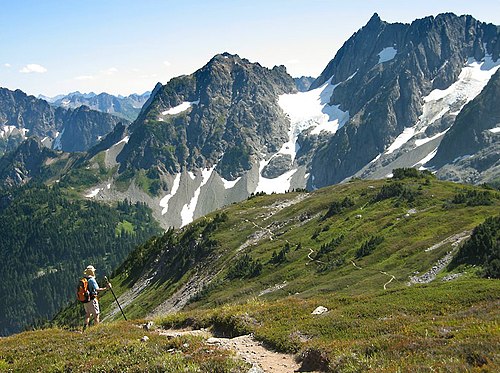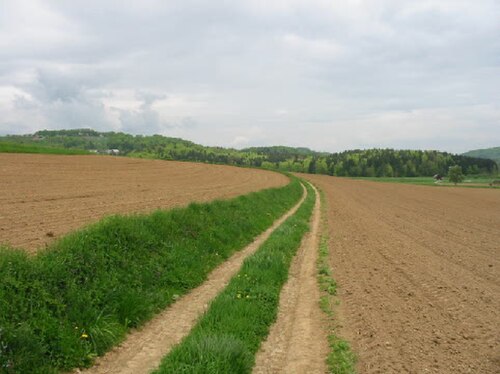Dragnoun
(uncountable) Resistance of the air (or some other fluid) to something moving through it.
Dragnoun
The bottom part of a sand casting mold.
Dragnoun
(countable) A device dragged along the bottom of a body of water in search of something, e.g. a dead body, or in fishing.
Dragnoun
A puff on a cigarette or joint.
Dragnoun
Someone or something that is annoying or frustrating, or disappointing; an obstacle to progress or enjoyment.
Dragnoun
A type of horse-drawn carriage.
Dragnoun
Street, as in 'main drag'.
Dragnoun
(countable) The scent-path left by dragging a fox, for training hounds to follow scents.
Dragnoun
A large amount of backspin on the cue ball, causing the cue ball to slow down.
Dragnoun
A heavy harrow for breaking up ground.
Dragnoun
A kind of sledge for conveying heavy objects; also, a kind of low car or handcart.
Dragnoun
(metallurgy) The bottom part of a flask or mould, the upper part being the cope.
Dragnoun
(masonry) A steel instrument for completing the dressing of soft stone.
Dragnoun
(nautical) The difference between the speed of a screw steamer under sail and that of the screw when the ship outruns the screw; or between the propulsive effects of the different floats of a paddle wheel.
Dragnoun
Anything towed in the water to retard a ship's progress, or to keep her head up to the wind; especially, a canvas bag with a hooped mouth (drag sail), so used.
Dragnoun
A skid or shoe for retarding the motion of a carriage wheel.
Dragnoun
Motion affected with slowness and difficulty, as if clogged.
Dragnoun
witch house music
Dragnoun
The last position in a line of hikers.
Dragnoun
The act of suppressing wind flow to slow an aircraft in flight, as by use of flaps when landing.
Dragnoun
Women's clothing worn by men for the purpose of entertainment.
Dragnoun
Any type of clothing or costume associated with a particular occupation or subculture.
Dragverb
(transitive) To pull along a surface or through a medium, sometimes with difficulty.
Dragverb
(intransitive) To move slowly.
Dragverb
To act or proceed slowly or without enthusiasm; to be reluctant.
Dragverb
To move onward heavily, laboriously, or slowly; to advance with weary effort; to go on lingeringly.
Dragverb
To draw along (something burdensome); hence, to pass in pain or with difficulty.
Dragverb
To serve as a clog or hindrance; to hold back.
Dragverb
(computing) To move (an item) on the computer display by means of a mouse or other input device.
Dragverb
(chiefly of a vehicle) To inadvertently rub or scrape on a surface.
Dragverb
(soccer) To hit or kick off target.
Dragverb
To fish with a dragnet.
Dragverb
To search for something, as a lost object or body, by dragging something along the bottom of a body of water.
Dragverb
To break (land) by drawing a drag or harrow over it; to harrow.
Dragverb
(figurative) To search exhaustively, as if with a dragnet.
Dragverb
(slang) To roast, say negative things about, or call attention to the flaws of (someone).
Dragverb
To perform as a drag queen or drag king.
Dragnoun
A confection; a comfit; a drug.
Dragnoun
The act of dragging; anything which is dragged.
Dragnoun
A net, or an apparatus, to be drawn along the bottom under water, as in fishing, searching for drowned persons, etc.
Dragnoun
A kind of sledge for conveying heavy bodies; also, a kind of low car or handcart; as, a stone drag.
Dragnoun
A heavy coach with seats on top; also, a heavy carriage.
Dragnoun
A heavy harrow, for breaking up ground.
Dragnoun
Anything towed in the water to retard a ship's progress, or to keep her head up to the wind; esp., a canvas bag with a hooped mouth, so used. See Drag sail (below).
Dragnoun
Motion affected with slowness and difficulty, as if clogged.
Dragnoun
The bottom part of a flask or mold, the upper part being the cope.
Dragnoun
A steel instrument for completing the dressing of soft stone.
Dragnoun
The difference between the speed of a screw steamer under sail and that of the screw when the ship outruns the screw; or between the propulsive effects of the different floats of a paddle wheel. See Citation under Drag, v. i., 3.
Dragverb
To draw slowly or heavily onward; to pull along the ground by main force; to haul; to trail; - applied to drawing heavy or resisting bodies or those inapt for drawing, with labor, along the ground or other surface; as, to drag stone or timber; to drag a net in fishing.
Dragverb
To break, as land, by drawing a drag or harrow over it; to harrow; to draw a drag along the bottom of, as a stream or other water; hence, to search, as by means of a drag.
Dragverb
To draw along, as something burdensome; hence, to pass in pain or with difficulty.
Dragverb
To be drawn along, as a rope or dress, on the ground; to trail; to be moved onward along the ground, or along the bottom of the sea, as an anchor that does not hold.
Dragverb
To move onward heavily, laboriously, or slowly; to advance with weary effort; to go on lingeringly.
Dragverb
To serve as a clog or hindrance; to hold back.
Dragverb
To fish with a dragnet.
Dragnoun
the phenomenon of resistance to motion through a fluid
Dragnoun
something that slows or delays progress;
Dragnoun
something tedious and boring;
Dragnoun
clothing that is conventionally worn by the opposite sex (especially women's clothing when worn by a man);
Dragnoun
a slow inhalation (as of tobacco smoke);
Dragnoun
the act of dragging (pulling with force);
Dragverb
pull, as against a resistance;
Dragverb
draw slowly or heavily;
Dragverb
force into some kind of situation, condition, or course of action;
Dragverb
move slowly and as if with great effort
Dragverb
to lag or linger behind;
Dragverb
suck in or take (air);
Dragverb
use a computer mouse to move icons on the screen and select commands from a menu;
Dragverb
walk without lifting the feet
Dragverb
search (as the bottom of a body of water) for something valuable or lost
Dragverb
persuade to come away from something attractive or interesting;
Dragverb
proceed for an extended period of time;
Dragverb
pull (someone or something) along forcefully, roughly, or with difficulty
Dragverb
take (someone) to or from a place or event, despite their reluctance
Dragverb
go somewhere wearily, reluctantly, or with difficulty
Dragverb
move (an image or highlighted text) across a computer screen using a tool such as a mouse
Dragverb
(of a person's clothes or an animal's tail) trail along the ground
Dragverb
catch hold of and pull (something)
Dragverb
(of a ship) trail (an anchor) along the seabed, drifting in the process
Dragverb
(of an anchor) fail to hold, causing a ship or boat to drift
Dragverb
search the bottom of (a river, lake, or the sea) with grapnels or nets
Dragverb
(of time) pass slowly and tediously
Dragverb
(of a process or situation) continue at tedious and unnecessary length
Dragverb
protract something unnecessarily
Dragnoun
the action of pulling something forcefully or with difficulty
Dragnoun
the longitudinal retarding force exerted by air or other fluid surrounding a moving object
Dragnoun
a person or thing that impedes progress or development
Dragnoun
unnatural motion of a fishing fly caused by the pull of the line.
Dragnoun
an iron shoe that can be applied as a brake to the wheel of a cart or wagon.
Dragnoun
a boring or tiresome person or thing
Dragnoun
an act of inhaling smoke from a cigarette
Dragnoun
clothing more conventionally worn by the opposite sex, especially women's clothes worn by a man
Dragnoun
a street or road
Dragnoun
a thing that is pulled along the ground or through water.
Dragnoun
a harrow used for breaking up the surface of land.
Dragnoun
an apparatus for dredging or for recovering objects from the bottom of a river or lake.
Dragnoun
another term for dragnet
Dragnoun
a strong-smelling lure drawn before hounds as a substitute for a fox.
Dragnoun
a hunt using a drag lure.
Dragnoun
influence over other people
Dragnoun
one of the basic patterns (rudiments) of drumming, consisting of a stroke preceded by two grace notes usually played with the other stick.
Dragnoun
short for drag race
Dragnoun
a private vehicle like a stagecoach, drawn by four horses.
Dragnoun
a car
Trailverb
(transitive) To follow behind (someone or something); to tail (someone or something).
Trailverb
(transitive) To drag (something) behind on the ground.
Trailverb
(transitive) To leave (a trail of).
Trailverb
(transitive) To show a trailer of (a film, TV show etc.); to release or publish a preview of (a report etc.) in advance of the full publication.
Trailverb
(intransitive) To hang or drag loosely behind; to move with a slow sweeping motion.
Trailverb
(intransitive) To run or climb like certain plants.
Trailverb
(intransitive) To drag oneself lazily or reluctantly along.
Trailverb
To be losing, to be behind in a competition.
Trailverb
(military) To carry (a firearm) with the breech near the ground and the upper part inclined forward, the piece being held by the right hand near the middle.
Trailverb
To flatten (grass, etc.) by walking through it; to tread down.
Trailverb
(dated) To take advantage of the ignorance of; to impose upon.
Trailnoun
The track or indication marking the route followed by something that has passed, such as the footprints of animal on land or the contrail of an airplane in the sky.
Trailnoun
A route for travel over land, especially a narrow, unpaved pathway for use by hikers, horseback riders, etc.
Trailnoun
A trailer broadcast on television for a forthcoming film or programme.
Trailnoun
(graph theory) A walk in which all the edges are distinct.
Trailverb
To hunt by the track; to track.
Trailverb
To draw or drag, as along the ground.
Trailverb
To carry, as a firearm, with the breech near the ground and the upper part inclined forward, the piece being held by the right hand near the middle.
Trailverb
To tread down, as grass, by walking through it; to lay flat.
Trailverb
To take advantage of the ignorance of; to impose upon.
Trailverb
To be drawn out in length; to follow after.
Trailverb
To grow to great length, especially when slender and creeping upon the ground, as a plant; to run or climb.
Trailnoun
A track left by man or beast; a track followed by the hunter; a scent on the ground by the animal pursued; as, a deer trail.
Trailnoun
A footpath or road track through a wilderness or wild region; as, an Indian trail over the plains.
Trailnoun
Anything drawn out to a length; as, the trail of a meteor; a trail of smoke.
Trailnoun
Anything drawn behind in long undulations; a train.
Trailnoun
Anything drawn along, as a vehicle.
Trailnoun
A frame for trailing plants; a trellis.
Trailnoun
The entrails of a fowl, especially of game, as the woodcock, and the like; - applied also, sometimes, to the entrails of sheep.
Trailnoun
That part of the stock of a gun carriage which rests on the ground when the piece is unlimbered. See Illust. of Gun carriage, under Gun.
Trailnoun
The act of taking advantage of the ignorance of a person; an imposition.
Trailnoun
a track or mark left by something that has passed;
Trailnoun
a path or track roughly blazed through wild or hilly country
Trailnoun
evidence pointing to a possible solution;
Trailverb
to lag or linger behind;
Trailverb
go after with the intent to catch;
Trailverb
move, proceed, or walk draggingly pr slowly;
Trailverb
hang down so as to drag along the ground;
Trailverb
drag loosely along a surface; allow to sweep the ground;
Trail
A trail is usually a path, track or unpaved lane or road. In the United Kingdom and the Republic of Ireland, path or footpath is the preferred term for a walking trail.































